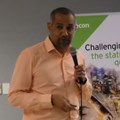
James Cullis, global service group leader: water, Aurecon
The continent’s lack of infrastructure affords us the opportunity to plot a development path that’s more geared towards sustainable development, said Cullis. We don’t have to make the same mistakes made by our developed counterparts. Cullis was part of the speaker lineup at the recently concluded 24th Annual FIDIC-GAMA Conference on Infrastructure. The 2017 iteration was themed “African Partnerships for Sustainable Growth”.
A healthy sense of optimism, however, requires a firm grasp of reality. Our reality is that, due to its infrastructure deficit, among other reasons, Africa is particularly vulnerable to climate change. But climate change isn’t our only challenge...
The African engineer’s trilemma
With rapid urbanisation, engineers are faced with increasing social pressure to address the backlog in terms of basic services and delivery, explained Cullis, while on the other side we have increasing environmental stress, not only as a result of climate change, but land use change, degradation of water quality, deforestation etc. The third issue entails current resource constraints to development in terms of financial, human, and natural capital. Cullis dubs this trilemma, with its extremely complex dynamics, a super wicked problem or a wicked problem squared.
Solving for a wicked problem squared
He believes engineers need to be less analytical and embrace disruption, innovation and new ways of thinking in order to solve these challenges. Problem-solving using the principles of design thinking is how Aurecon goes about its business, using a more empathetic approach that really grapples with a challenge before implementing a solution.
"We as engineers like to jump into the solution as quickly as we can, and often it's the wrong solution because we don't actually understand the problem," he said.
Emphasising the necessity of collaboration between all stakeholders - engineers, clients, communities, decision-makers - Cullis said, “We've got to co-discover the challenges as well as co-explore the solutions.”
We also need to invest in quality infrastructure in Africa, he said, based on principles such as full lifecycle cost accounting encompassing both direct and indirect economic impacts.
Inclusivity is also becoming more and more a priority in the infrastructure development space. "Instead of transplanting information and knowledge from the West and putting it into Africa, it has to be much more inclusive - you have to think about issues that are relevant, like job creation, inequality, using local knowledge, and local information. There's a big drive to use more African consulting engineers, design engineers and practitioners on the ground," said Cullis.
Building for the future
As a forward-thinking profession, engineers need to consider future risks for the continent, such as those presented by climate change, he said. It makes sense to prepare for these risks now by rolling out resilient infrastructure, which can take up to 20-30 years, as this could help mitigate the impact of potential extreme scenarios into the future.
There are also a number of benefits to building for resilience, said Cullis, as he explained the concept of 'realising the resilience dividend'. He used the example of investing in a stormwater drainage system built around a water-centred urban design concept that uses urban river corridors. The system could help preserve those rivers, build wetlands and open areas along floodplains, and in the process this has positive impacts on water and air quality, provides opportunities for urban agriculture, reduces the urban heat island effect, all of which has benefits for surrounding communities.
"We need to start embracing that approach of building forward so that we don't make the same mistakes that have been made in the past when we try to build the infrastructure of Africa going forward," concluded Cullis.
Go to www.fidic-gama2017.org.za for more info on the conference. For more info on FIDIC and its members, go to www.fidic.org. FIDIC-GAMA 2017 was held at the CTICC, 7-10 May.







































